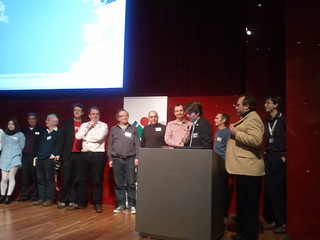By Mason
The new Wikimedia project Wikidata is set to become the latest battleground over who controls what is and is not considered part of the “sum of human knowledge” that the Wikimedia Foundation is keen to collect and present.
The idea behind Wikidata is a simple one: to classify and categorize essentially everything in the universe. Well, not everything: with a few exceptions, it must be “notable” according to one or more of the Wikipedias (English Wikipedia, of course, being its biggest – but not exclusive – source.) Don’t expect your plumber or mechanic to become a data point on Wikidata… at least not in Phase 1. The front page of the site describes Wikidata as “a free knowledge base that can be read and edited by humans and machines alike.”
Unlike Wikipedia, where prose rules and nuances can be explored if the writers choose to explore them, Wikidata is structured in a colder, more robotic fashion: there is either a “statement” (such as “sex = male”) or there is not. There’s little room for nuance on Wikidata.
Wikidata articles are called “queries” or “items”, and each one has a Q number. The “number of the beast”, fittingly, is listed at Q666, although in general the Q numbers bear no relation to the item itself. But let’s move away from the devil and take a look at Jesus. Here is how Wikidata’s “item” on Jesus appears:
label: Jesus description: central figure of Christianity Also known as: Jesus of Nazareth, Jesus Christ, Christ, Yeshua, Yehoshua, The Messiah, God the Son, Son of God mother: Mary main type (GND): person sex: male place of birth: Judea place of death: Judea father: Saint Joseph VIAF identifier: 38323081 Library of Congress Control Number: n79084784 image: Christ oriental.jpg  …continue reading Wikidata: Is Jimbo More Popular Than Jesus?
…continue reading Wikidata: Is Jimbo More Popular Than Jesus?


